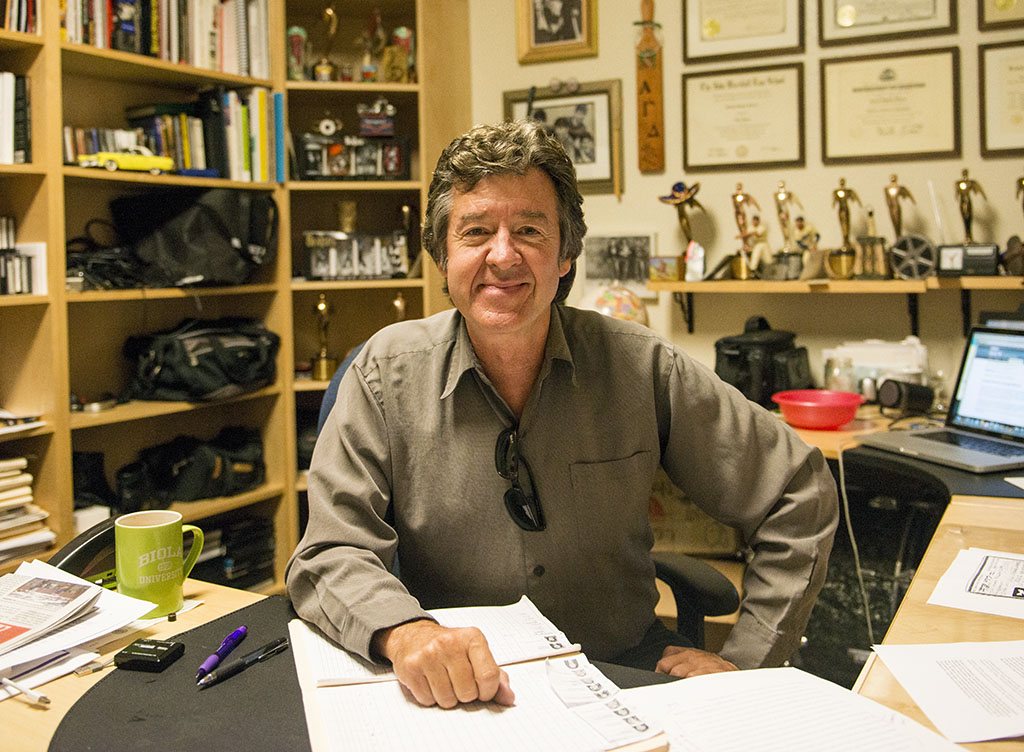
Stewart Oleson, associate professor of journalism and broadcast journalism advisor, will be hosting a comedy show in concordance with the Center for Christianity, Culture & the Arts. | Ashleigh Fox/THE CHIMES [file photo]
Any student who has had Stewart Oleson for a class will tell you that laughing is an integral part of his personality, and now the rest of Biola finally has the opportunity to witness it.
To showcase Oleson’s talents, the Center for Christianity, Culture & the Arts is hosting Stewed! on May 2 as an evening of comedy and improv. Oleson performed stand up comedy routines for many years and was a part of an improv group called the Original Comedy Rangers in Chicago and Los Angeles. The event will be held in Mayers auditorium at 7:30 p.m. and is free to students and guests. Stand up comedy, improv music and audience interaction will all be a part of the evening, Oleson said.
“I’m going to take the audience on a musical and comedy odyssey from the ‘60s to today,” Oleson said.
Oleson will also be sharing observations that he has made about the Biola culture in a comedic light.
Q: Would you like to share some of the observations that you have about Biola, or would that be spoiling the evening?
The heavy one is the relationship thing, which I’m still trying to figure out. It’s a work in progress. I think it’s over-thought. I think in a beautiful setting, when you meet someone and there’s a spark, it’s a wonderful thing. If you then overcook it, it tends to get overcooked and overanalyzed and that spark goes away. I think that’s too bad, and when I see that happening I just go, “Aww.” Can’t we just, as the Beatles say, “Let it be”?
That’s one thing that I have noticed here. The other thing would be the “Biola Bubble” that we talk about a lot. I encourage all of my students to get into Los Angeles; it’s the second biggest city in the country and it’s right down the road. If you stay on campus in a sort of safety zone, you don’t get a flavor for what’s really out there and to me that’s part of the beautiful experience of college. I don’t have kids, but if I did, I would absolutely tell them to go out and experience it.
Q: How long has it been then since you’ve done a stand-up show?
I do it every year — bits and pieces, not in front of a crowd like this. This is very unique because it’s on Biola’s campus, so it’s going to be interesting navigating this. Not that I have to edit myself, it’s just different. I’ve done a bit at the comedy store in L.A., but that’s been about four years. I should do more of it, but it’s a little hard though when I’m teaching to then get up the energy. So it’s been a few years since I’ve done a full one stand-up show — I guess you can’t count class.
Q: How do you think that comedy has influenced you as a journalist and as a professor?
I think it’s a huge asset in every part of life. I think the research will show, even in relationships, that comedy is second to sharing emotions in terms of it’s importance. When you laugh, you feel good. When you’re laughing, that’s usually the most real that you are in that moment. So for me in law — I was a trial lawyer — it was invaluable because I could get up in front of a jury, and not crack jokes, but be open to humor. I did that on morning shows too. I took news and mixed it with comedy, and that was a great run.
Q: How do you think comedy should integrate with our spiritual lives?
It’s always been natural to me because it’s who I am. I never compartmentalize and it’s funny because my name is Stew. I’ll talk about that on stage … how my parents came up with that because that’s truly who I am. They didn’t know that right when I was born — how did they know that I should be called Stew? It’s just this stew of stuff … I don’t put my faith over here, comedy over here and music over there. That would be silly because every day you have to decide what you’re going to do. And then the question is, did Jesus have a sense of humor … yeah, I think. It would only be natural, and I don’t consider that sacrilegious at all. I consider that part of the human aspect of him. I think comedy, coming from a natural place, is very spiritual and integral to who you are and how you share your faith. I think that’s how I was created, so why deny that?
Q: Would you like to do more shows like this in the future at Biola?
I think it has a purpose here. I might have gone too far with this one considering all the things I have prepared for it. It might be hard to follow up.
Q: How do you think that comedy is culture on its own?
It speaks to the human condition better than any other art form I know of. Music has to be right up there, but I think comedy is even more valuable than music when we are able to laugh at our problems, we’re able to laugh at ourselves and we’re able to share laughs with others.







